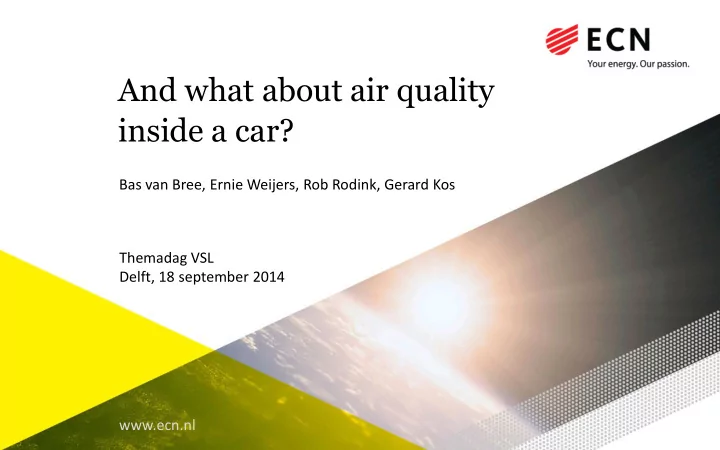

And what about air quality inside a car? Bas van Bree, Ernie Weijers, Rob Rodink, Gerard Kos Themadag VSL Delft, 18 september 2014 www.ecn.nl
ECN Milieu Duurzame Leefomgeving Circulaire Economie Meten, modelleren, beleidsadvies: Testen, modelleren, beleidsadvies: • • Fijnstof Advisering veilige toepassing • • Stikstof Proces- en productontwikkeling • VOC’s + SOx + overig gasvormig
Monitoring stedelijke luchtkwaliteit Eindhoven Real-time monitoring AiREAS / Innovatief Lucht Meetnet • PM 1 -PM 2,5 -PM 10 (30 locaties) • Ultrafijnstof (6 locaties) www.aireas.com
Air Pollutants • Particulate Matter - Lung, potential effects on heart • Nitrogen Dioxide - Lung irritant, ozone contributor • Carbon Monoxide - Circulatory system, heart • Ozone - Respiratory system, lung • Lead - Nervous system, brain • Diesel Exhaust - PM contributor, respiratory, cancer • Sulfur Dioxide - Impaired respiratory function, PM contributor • Carbon Dioxide - Climate change
Background Driving on busy roads exposure of car passengers? 9 th ETH Conference on Combustion generated Nanoparticles (2009): Jean Morin “car cabin does not protect from traffic generated pollution” Questions Ministry of Environment: • What about vehicle air quality? • Influence of ventilation, filtration, recirculation? • Exposure in the car’s cabin?
Experimental setup Volkswagen Touran
Experimental setup (2) Instruments: • 2xNOx chemoluminescence (Ecophysics) • 2xCondensation Particle Counter (3007 TSI) • GPS • Inlets at the front (grill) and near driver’s head Ventilation: • Different ventilation modes and recirculation; windows always closed Traject: • Alkmaar City ring, Motorway Alkmaar- Amsterdam Limitation: • Mixing of air in the cabin unknown …
Ventilation system HVAC system = Integrated Heating, Ventilation and Air Conditioning system Air cabin filter = dust pollen filter no specification of efficiency “eliminates most pollutant particles such as fumes, bacteria, pollen and dust that come into your car”
Day 1: particle number Lower particle numbers inside Correspondence in variation Peak values outside not observed in the cabin
Day 1: particle number Again: correspondence with what happens outside Delay time visible
Day 1: particle number Very low numbers inside the car Decoupling inside-outside
averages and ratios inside outside ratio Levels inside 50-60% lower mode no. 2 27828 65358 0,43 mode no. 1 25186 56210 0,45 during ventilation recirculation 4027 55058 0,07
Day 2: ratios Motorway
NO&NO2 (1-min averages) Ventilation: hardly any change in NO, small time delay; less correspondence for NO2 Recirculation: decoupling
averages NO and NO2 Ventilation: ratio in-vehicle to on-road close to 1 Ring road NO inside outside ratio mode no. 2 321 347 0,9 mode no. 1 221 220 1,0 recirculation 175 264 0,7 NO2 inside outside ratio mode no. 2 46 59 0,8 mode no. 1 50 55 0,9 recirculation 55 74 0,7
Day 2: Ventilation: ratio in-vehicle to on-road close to 1 Motorway NO inside outside ratio mode no. 1 365 391 0,9 mode no. 0 314 317 1,0 recirculation 321 354 0,9 NO2 inside outside ratio mode no. 1 61 55 1,1 mode no. 0 50 51 1,0 recirculation 55 50 1,1
Summarizing (1) Effect of ventilation • Particle number concentrations in vehicle air roughly 45% of on-road levels • NO/NO2: no clear difference during ventilation Effect of recirculation • Drastic decrease in number concentration in vehicle air (<15% of on road level) • NO/NO2: no difference; steady level?
Summarizing remarks (2) Exposure: • NO and NO2: similar as on the road • Particle number: less but still above urban background while ventilating • Car’s cabin does (indeed) not protect against traffic pollution • Setting a car’s ventilation system to “recirculate” is the best way to reduce exposure to particulate pollution • But not so effective as cutting back your driving time …
We need more ventilation …
Meer weten? ECN Environment & Energy Engineering Bas van Bree Business Development Manager Westerduinweg 3 1755 LE Petten The Netherlands T: +31 88 515 4427 M: +31 6 2271 1515 (NL) vanbree@ecn.nl
Recommend
More recommend